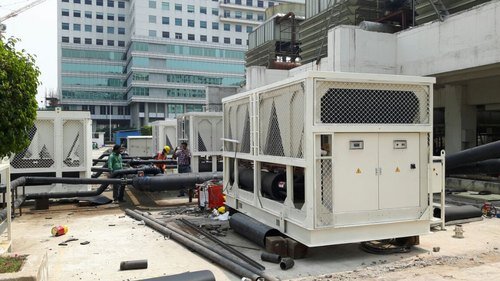Chillers are used in different applications where chilled liquid needs to be circulated throughout process equipment. This is often used to cool both machinery and products for such applications as injection molding, food and beverage production, tool and die-cutting, lasers, semiconductors, and others.
The chiller’s type and use largely depend on the temperature needed and the kind of refrigerant, which may either be gas or liquid.
In this post, London Climate Hire shares information on the uses of industrial chiller and how it works:
Uses of a Chiller
For decades, various industries have found ways to provide necessary cooling for manufacturing processes. Even though the air conditioner has been around since the early 20th Century, it’s not capable of delivering the needed temperature for large facilities and production processes.
Work Environment
On the floor of a manufacturing company, temperatures can instantly spike when equipment is running for hours, making the working environment unsuitable and even unsafe for employees. To keep employees safe, industrial operations use chillers to ensure that working conditions are kept at just the right temperature. Chillers, in this case, perform as air conditioners and depending on the building, the air cooling chiller may be either inside or on top of the building.
Metal Plating
The industry of metal plating makes use of high-temperature electroless or electroplating in the plating process. Heavy-duty chillers are required in this industry to remove heat from the plated metal efficiently.
Plastic Manufacturing
Plastic is highly sensitive to temperature, so when it gets too hot, it can be damaged. The right cooling temperature of a mold will dictate the quality of the product. Chillers can provide a cooling bath to keep the quality of the plastic products being produced.
Food Production
The food industry is strict when it comes to its regulations for storage temperature to maintain the freshness and safety of the foods being manufactured. Chillers effectively send cooling gases through the cooling coils, ensuring that food products are kept at the approved temperature.
Pharmaceutical
The manufacturing of medicine requires chilled water as well as precise control of temperature. Chillers can be accurate, whether they’re central process chillers or compact process chillers. The common types of chillers used for pharmaceuticals include reciprocating, centrifugal, screw-driven, and absorption.
How Chillers Work
Most process cooling applications use a pumping system that circulates either cool water or a water and glycol solution from the chiller to the process. The goal of this cold fluid is to remove heat and let warm fluid return to the chiller.
Process chillers have a chemical compound known as refrigerant. There may be different types of refrigerants, but they all work on the same principle.
The process of heating and cooling the refrigerant then changing from gas to liquid and back again is called the refrigeration cycle.
Two types of condensers are used in chillers – air-cooled and water-cooled. The former makes use of ambient air to cool and condense the refrigerant gas to a liquid, while a water-cooled condenser uses water from a cooling tower to cool down and condense the refrigerant.
Conclusion
No industrial process or equipment is 100% efficient, and heat is the most common cause of inefficiency. If heat is not removed, it could accumulate and cause a reduction in production time or even equipment shutdown and failure. Using an industrial chiller is indeed beneficial as it offers consistent temperature and pressure.
There are different sizes and designs of chiller systems, and the right choice for you depends on the application and your requirements. No matter your needs, London Climate Hire can provide you with the most suitable chiller rental solution in London and nearby areas. Contact us to know more about our chiller hire options!

